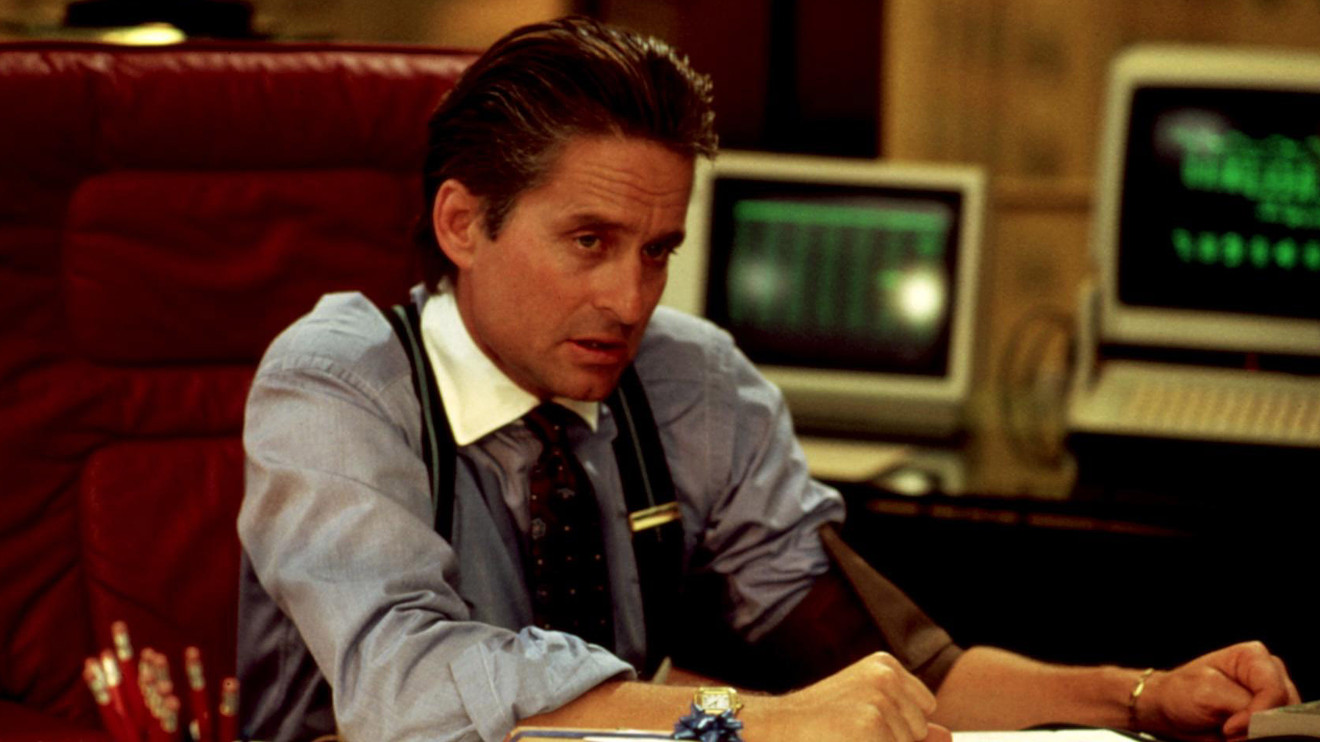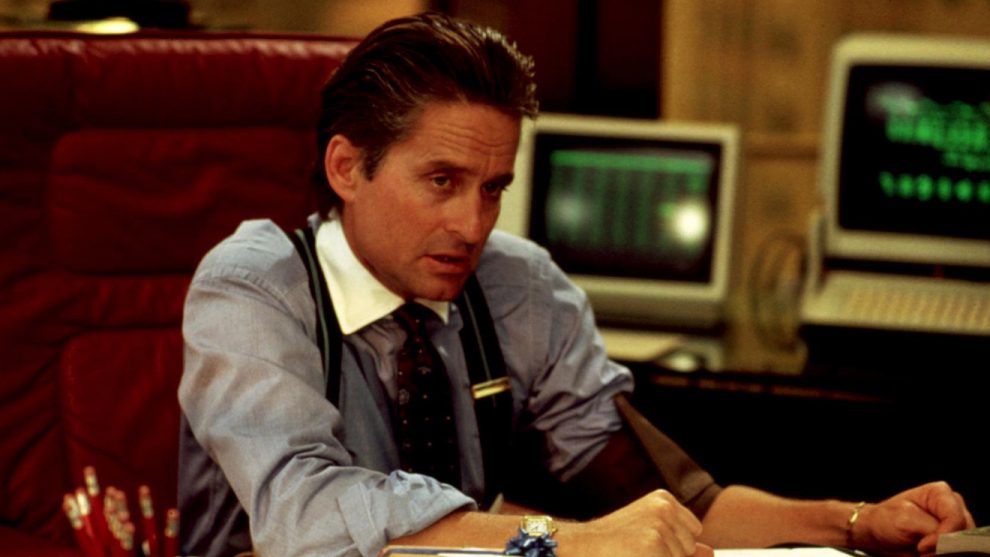
Gordon Gekko was a bad guy in a movie released 32 years ago, and yet he is still widely quoted on Wall Street today.
And as many on the Street know, May 6 is Gekko’s birthday.
Played by Michael Douglas in an Oscar-winning performance in the 1987 film “Wall Street,” Gekko’s charisma and success was something for people in the industry to aspire to. He was the villain, but a lot of what he said echoed real-life lessons learned, and was passed down on trading desks for years.
“Even though his character is obviously evil, he’s played in a very stylish and aspirational fashion,” said Art Hogan, chief market strategist at National Securities Corp. and a Wall Street veteran. “If not for his malfeasance, you’d want to be that person.”
And Gekko’s appeal spans multiple generations. Hogan said people in the industry who were born after the movie came out will often quote Gekko.
“The only movie quoted more in my lifetime is ‘Caddyshack,’” Hogan said, referring to the 1980 comedy starring Chevy Chase and Rodney Dangerfield.
Gekko is best known for the line: “Greed is good.” True enthusiasts might annoyingly tell you, however, that he didn’t actually say that. Here’s the actual quote:
“The point is, ladies and gentlemen, that greed, for lack of a better word, is good. Greed is right. Greed works. Greed clarifies, cuts through and captures the essence of the evolutionary spirit.”
He goes on: “Greed, in all of its forms — greed for life, for money, for love, knowledge — has marked the upward surge of mankind.”
In honor of Gekko’s birthday, I thought I’d share my five favorite Gekko quotes, and why they are on the list.
Note: The “greed” line isn’t listed, partly because it’s over-quoted, but mostly because it didn’t quite apply to a lesson learned during the nearly 11 years I spent in the industry.
1. “I don’t like losses, sport. Nothing ruins my day more than losses.”
One of the first things I learned, the hard way, was that the best way to make my trading budget — my profit target for a given period — was to not lose money. And if I had to lose money, lose as little as possible. The way I figured it, a loss was three times worse than a profit was good.
Say you had to average a gain of $1,000 a day to make budget. If you lose $1,000 one day, then you have to make $3,000 the next day just to get back on track. That requires you to take on more risk than what might suit your trading style, leaving you more vulnerable to bigger losses.
Being “patient,” until the market does what it’s “supposed” to do, often doesn’t work. It’s better to cut, and start over, than let losses ride.
And the idea that you have to be “in it to win it” is for suckers who haven’t learned that it’s better to be square — have no position — than to recklessly jump into the market.
That lesson leads to my second favorite quote:
2. “I don’t throw darts at a board. I bet on sure things. Read Sun Tzu, ‘The Art of War.’ Every war is won before it is ever fought.”
One might argue that there are no sure things. But that’s not exactly the point.
Another lesson learned was the hard work should be done before entering a position, because once the trade is made, the market will dictate your actions.
The hard work includes gathering all the information you can, including opinions from as many others on the Street to gauge market sentiment. Then, map out a trading plan, especially an exit strategy, and try to stick to it, unless there is new information or market conditions take an unforeseen turn.
Basically, know what you’re going to do for as many potential outcomes as possible, so if/when the market starts moving fast you can just react rather than waste time thinking. It helps keep emotion out of the decision-making process.
3. “First lesson in business is: Don’t get emotional about stock, clouds your judgement.”
Easier said than done, but this might be the quote that rings the most true, and about more than just the financial markets.
When analyzing the decisions that led to losses, I found most of them were suffered after the trade was entered. And behind most bad decisions was some form of emotion; in most cases, the emotion was pride.
Being too stubborn to cut a position, not wanting to be criticized for potentially buying at the high or selling at the low, taking profit/cutting a loss too early, wanting to show everyone else that they were wrong, etc., were among the emotions behind many bad decisions.
There’s another quote from the movie that also supports this point, from Hal Holbrook’s character, Lou Mannheim: “The main thing about money, Bud, it makes you do things you don’t wanna do.”
4. “Money never sleeps, pal.”
When “Wall Street” came out, there was no official premarket or after-hours trading in the stock market, but that didn’t mean money took the night off. News/information that could move the market was 24/7.
The quote rang especially true for me, because I was in the currency market, which was officially open somewhere around the world between Sunday afternoon in New York until 5 p.m. Eastern on Friday.
While it was always safer to be square while sleeping or into the weekend, the last thing you wanted was to hear from colleagues and friends about how much money they made while you were sleeping, or your boss asking why didn’t make any money when everyone else did.
And if you were late to hear market-moving news during working hours, that always brought condescending comments from around the trading desk: “Yeah, and Lincoln was shot, too.”
So I learned you always had to be “on,” because everyone else was.
There’s another Gekko quote that hammers home this point: “Lunch? Ahh, you gotta be kidding. Lunch is for wimps.”
5. “It’s all about bucks, kid. The rest is conversation.”
That quote doesn’t mean, to me, that money is the most important thing in life. The point is that trading, or investing, isn’t about being right or wrong about where the market is going, it’s about making money, because it’s always better to be wrong and make money than be right and lose.
It also suggests that there is no excuse for losing money on a trade, or a reason you made money, that is more important that the actual money won or lost.
And perhaps most important, once a trade is closed, don’t even consider how much more you could have made, or how you could have lost less.
When you hear yourself saying, “I should have waited,” or “if I didn’t have to run to the bathroom…” just remember, that is just conversation.
I would say in closing, “Happy birthday, Gordon,” but as true fans know the actual quote was, “Good morning, Gordon.”
What quote do you think I should have included?











Add Comment